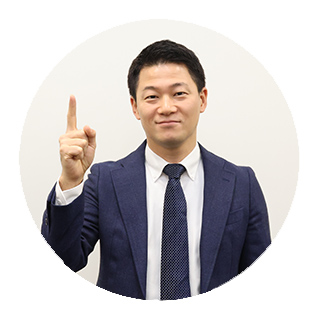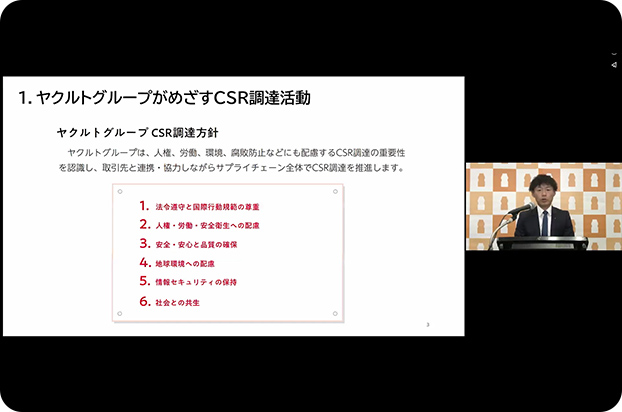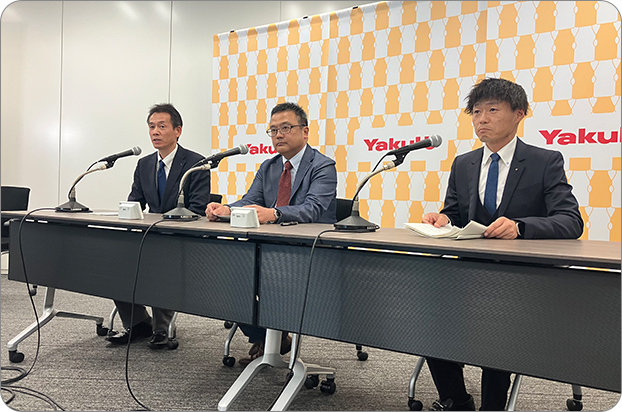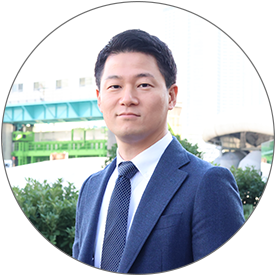 Establishment of a resilient
Establishment of a resilient
and sustainable supply chain
Materiality
and sustainable supply chain Materiality
Our approach
A sustainable supply chain is essential in delivering high-quality products that are safe and secure to people around the world. In addition to considering quality and cost, we will promote initiatives to enhance transparency throughout the supply chain to ensure respect for human rights, prevent corruption and reduce the environmental burden.
Specific initiatives
- Promoting sustainable procurement
- Building sound relationships with business partners
- Ensuring stable procurement of raw materials
- Optimizing logistics etc.
Yakult Group CSR Procurement Policy
Basic policy on
sustainable procurement
Yakult Group CSR Procurement Policy
Recognizing the importance of sustainable procurement that takes into consideration issues such as human rights, labor, the environment, and anti-corruption, the Yakult Group will promote sustainable procurement throughout the supply chain, in cooperation with our business partners.
1 Respect regulatory compliance and international codes of conduct
We will comply with national and local laws and regulations, respect international codes of conduct, and promote fair and equitable procurement activities.
2Consider human rights, labor, safety and health
We will prohibit the use of child labor and forced labor, respect fundamental human rights, and promote procurement activities that take into consideration the work environment, safety and health.
3 Ensure safety and quality
We will promote procurement activities, giving attention to cost and stable supplies, and aim to ensure high quality and safety.
4 Consider the global environment
We will promote procurement activities that comply with the Yakult Basic Policy on the Environment and take into consideration the global environment.
5 Maintain information security
We will strictly control confidential information on procurement transactions and use it only for legitimate purposes.
6Coexist with society
We will promote procurement activities that take into consideration social contributions towards coexistence with society.
(Established in March 2018)
Yakult Group Supplier CSR Guidelines
Based on the Yakult Group CSR Procurement Policy, the Yakult Group Supplier CSR Guidelines were formulated in July 2020 in order to effectively promote sustainable procurement within the Group and help create a sustainable society. The guidelines are a collection of requirements regarding responsible procurement activities for all our business partners in Japan and overseas, including new business partners.
In order to ensure adherence to these guidelines, we hold a briefing for suppliers on our CSR Procurement Policy during which we explain the contents of the guidelines. In addition, for each requirement in the guidelines, we check the status of supplier efforts through surveys and audits, and if any problems are found, we take action aimed at improvement.
Together with using these guidelines, the entire Yakult Group will continue striving to promote sustainable procurement.
Working with our suppliers to promote sustainable procurement
The Yakult Group promotes sustainable procurement, which takes into consideration such issues as human rights, labor, the environment and anticorruption in the supply chain, and positions it as a key theme in the stable production and sale of products that help promote good health and the creation of a sustainable society. By communicating actively to achieve effective collaboration with our suppliers, we aim to improve the sustainability of society by taking our environmental and social impact into consideration and reducing risks throughout the supply chain.
- Click here to “Working with suppliers toward sustainable procurement”

Working with suppliers toward sustainable procurement
Deforestation and Conversion Free (DCF) Commitment to Responsible Sourcing
The planet's environment is at risk due to global warming, environmental pollution, loss of biodiversity and depletion of natural resources. Based on the Commitment, we will pursue our business activities while considering the planet's environment and the lives and human rights of the people supported by the environment, and to create a society where people and the planet can coexist forever.
We have identified raw materials at risk of deforestation in our supply chain and are committed to promoting sustainable procurement of these materials, setting out our basic policy, initiatives and targets.
Initiatives and targets/KPIs
We identify pulp and paper, palm oil, soybeans and dairy products (e.g., skim milk powder) as raw materials with a high-risk of deforestation, set targets and KPIs for their sustainable procurement, and promote responsible procurement in our supply chain.
*The quantitative targets and KPIs will be reviewed and updated as appropriate to improve ongoing efforts in the Commitment.
| Scope | All consolidated sites in Japan and overseas involved in the procurement of raw materials to produce food and beverages, pharmaceuticals and cosmetics for the Yakult Group |
|---|
| Commodities | Target fiscal year | Quantitative targets |
|---|---|---|
| Pulp and paper | 2025 | 100% of the pulp and paper procured for paper containers and packaging to be switched to internationally certified materials such as FSC® or recycled paper |
| Palm oil | 2025 | 100% of palm oil procured to be switched to RSPO-certified products (MB and above) |
| 2030 | 100% traceability of palm oil procured as a primary raw material back to the agricultural origin of its production | |
| Soybeans | 2030 | 100% traceability of soybean procured as a primary raw material back to the agricultural origin of its production |
| Dairy products | 2030 | 100% traceability of dairy products (e.g., skim milk powder) back to the source, such as the dairy farmer, in collaboration with suppliers |
Progress report on the DCF Commitment
The Yakult Group is taking initiatives to verify Deforestation and Conversion Free in its supply chain.
Explainer video related to the Commitment
- Click here for the explainer video related to the Commitment.
 ×
×The explainer video related to Yakult's Deforestation Free Commitment
Examples of Initiatives
Raw materials : RSPO certification and JaSPON membership
We joined the Roundtable on Sustainable Palm Oil (RSPO) in fiscal 2023 to further our progress on sustainable procurement of palm oil in accordance with our Deforestation and Conversion Free (DCF) Commitment to Responsible Sourcing. Furthermore, in July 2025, Yakult Honsha and Yakult Foods Industry Co., Ltd.,*1 received RSPO Supply Chain Certification*2 (Mass Balance model). Additionally, in fiscal 2023, we joined the Japan Sustainable Palm Oil Network (JaSPON), which engages in activities to promote sustainable procurement and consumption of palm oil in the Japanese market.
*1 Yakult Foods Industry Co., Ltd. manufactures noodles and sells various food products. The frying oil it procures for instant Chinese noodles is the only ingredient subject to the quantitative target for palm oil,“100% of palm oil procured shall be RSPO-certified (MB or above),” in our Deforestation and Conversion Free (DFC) Commitment to Responsible sourcing.
*2 RSPO Supply Chain Certification: A system for certifying that the manufacturing, processing and distribution of products using RSPO certified palm oil meets the requirements set by RSPO.
Supplier risk management:Towards reducing sustainability risks among our suppliers
Based on our CSR Procurement Policy, we carry out supplier risk assessments using an international data sharing platform that Sedex* provides and a sustainable procurement survey in order to identify high-risk suppliers concerning relevant issues, such as the environment, human rights, occupational health and safety, and anti-corruption. The fiscal 2024 survey was carried out for 261 business partners in Japan according to the selection criteria below, accounting for the top 90% of our suppliers ranked by total procurement cost related to manufacturing.
In consideration of the aforementioned results, we carefully select business partners, identify their challenges, and explore appropriate measures. We also engage in on-site visits to enhance engagement.
* A membership organization that provides an international data sharing platform aimed at responsible procurement
Supporting communities with local employment and sourcing
To contribute to the sustainable development of the countries and regions where we operate, we conduct our global business with a local focus based on local production and sales using raw materials that can be stably procured and satisfy our product quality and safety standards.
Yakult Group currently operates in 40 countries and regions including Japan, with 27 overseas companies. We have established sales offices and production plants with deep ties to local communities, and actively hire local employees.
Percentage of locally sourced raw materials for dairy products(fiscal 2024)

* Results for dairy product raw materials
Note: Raw materials that are imported and undergo final processing in Japan are calculated as local Japanese materials.
Special
Report
Report from the Frontlines
Promoting sustainable procurement through collaboration with our suppliers: CSR Promotion Section, Public Relations Department

Promoting sustainable procurement through collaboration with our suppliers: CSR Promotion Section, Public Relations Department
We have held CSR Procurement Policy briefings annually for our suppliers since fiscal 2021. These briefing sessions help us promote effective sustainable procurement while building stronger communication with our suppliers and developing a shared understanding of issues related to sustainable procurement. In this article, one of our managers explains more about these sustainable procurement efforts.
Why does Yakult engage in sustainable procurement?
In all of our business activities, we must fulfill our social responsibilities by complying with laws and regulations, considering the global environment, respecting human rights and managing information securely. To ensure that Yakult meets these social expectations, we communicate proactively with suppliers and work together to consider social and environmental impacts and mitigate risks throughout the supply chain in our efforts to improve sustainability of society.
Our suppliers’ understanding and cooperation are particularly essential to our initiatives that contribute to environmental and social sustainability. The Yakult Group sees supply chain management as a material issue, and the promotion of sustainable procurement occupies a place of critical importance within our sustainability and sustainable activities. We select our suppliers according to procurement cost criteria, raw material criteria and other qualitative criteria, and thereby promote risk management among these suppliers.
For major business partners like raw material suppliers and manufacturing subcontractors, we offer explanatory seminars to explain the Yakult Group CSR Procurement Policy, and have conducted a CSR procurement survey since 2019 to encourage self-evaluation. In an effort to provide all suppliers with more easily understandable explanations of our policies and initiatives, in fiscal 2021 we began holding CSR Procurement Policy briefings for suppliers.
Helping suppliers understand Yakult more deeply through briefings
At our CSR Procurement Policy briefings for suppliers, we share information on supply chain management and initiatives that contribute to sustainability, as well as provide support activities aimed at raising awareness and building capacity related to sustainable. As we prepare for these briefings, our greatest concern is finding, compiling and delivering useful information for our suppliers. Our approach to each briefing involves listening to feedback from suppliers and people from related departments within Yakult, and organizing these observations in order to provide information and initiatives that will help resolve on-site concerns and issues.
The third briefing, held in December 2023, was attended by approximately 440 people from 160 companies that supply and sell raw materials to Yakult Honsha. Some 40 people from related departments within Yakult participated as well.
During the briefing we covered topics such as the Yakult Group CSR Procurement Policy and the results of the year’s CSR procurement survey, along with current challenges and how we plan to approach resolving them. After that, a representative from Sedex, a membership organization that provides an international sustainable procurement data-sharing platform, gave a presentation on the Sedex organization and the benefits of using the platform. Outside experts and our company’s CSR Promotion Section General Manager also shared information about the creation of promotional systems and specific measures around sustainable procurement, along with advice for resolving the challenges and concerns facing our suppliers. Finally, our Purchasing Department General Manager, our Development Department General Manager and our CSR Promotion Section General Manager took the stage together to answer a series of questions.
Participants remarked that the briefing gave them a deeper understanding of Yakult’s policies and initiatives and the necessity of efforts to respect human rights through the use of the Sedex platform, and that it provided them with information that would be useful for their future initiatives. Our suppliers also expressed concern about the creation of systems for promoting sustainability, noting the difficulty of building awareness throughout the supply chain. Recognizing that these concerns are similar to the ones our own company faces was an extremely important outcome.
The briefing was recorded and posted online so that the day’s events could be reviewed even by suppliers who were unable to attend. Moving forward, we will undertake concrete actions to address issues related to dialogue and support.


At the CSR Procurement Policy briefing for suppliers
Actions throughout the supply chain to realize good health for people and the planet.
We believe there are two reasons why communicating Yakult’s supply chain management initiatives to outside companies is meaningful.
The first reason is the impact this communication has on our suppliers. We view contributing to social and environmental sustainability as beneficial not just for Yakult but also for our suppliers. Since the understanding and cooperation of our suppliers are essential for achieving these goals, we see our sustainability briefings as important opportunities to share information.
The other reason is the effect that this communication has on related departments within Yakult. To communicate our stance to suppliers, naturally we must be unified as a company in our understanding and actions. Through repeated discussions with relevant departments, we are working to foster a sense of solidarity within the company and improve effectiveness as we put our corporate belief that “in order for people to be healthy, everything around them must also be healthy” into practice throughout the supply chain.
Employee Comment

Company: CSR Promotion Section, Public Relations Department, Yakult Honsha Co., Ltd.
Title: Assistant Manager
Name: Yuki Kamikubo
**Affiliation and title are as of the time of the interview.
Employee Comment
I believe that the difficulties with sustainability-related work arise from the need to resolve issues throughout the entire supply chain. Seen another way, this is exactly what makes our work enjoyable and meaningful, since it has such a large impact and places on us such a great amount of responsibility. There are numerous challenges to overcome, but I believe these efforts will bear fruit in the smiling faces of the children of the future.
- Home
- / Sustainability
- / Social
- /
- Establishment of a resilient and sustainable supply chain

